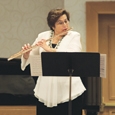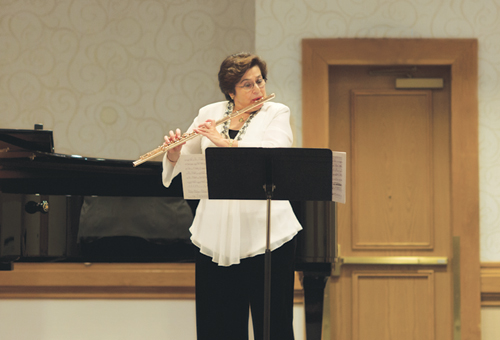
Flutist Trudy Kane was principal flute of the Metropolitan Opera Orchestra in New York City for 32 years before accepting a position as professor of flute at the Frost School of Music at the University of Miami in 2008. Kane earned her bachelor and master’s degrees from The Juilliard School where she studied with Julius Baker. She can be heard on soundtracks of many film scores, and of course on many of the Live from the Met videos.
What were some of the challenges working in Metropolitan Opera Orchestra?
Operas are long. A 90-minute symphony concert is equal to one act of some operas. Most operas have three acts. Often we had a rehearsal earlier in the day as well.
For most operas we rotated the personnel to fit the schedule, so it was not unusual to come in and not know with whom you would be playing. There are four flutes on full time salary: two principals, a second flute, and a piccolo. There is also a pool player who is always the first to be offered any extra work. Extra players are called in as needed.
What was your typical schedule like?
Every day and week was different. Rehearsals are as short as 21/2 hours or as long as 5, occasionally longer. Performances range in length from the occasional short ones such as Salome, Elektra, and Wozzeck to Gotterdamerung (6 hours). Each musician is contracted for four performances a week, and the number of rehearsals is variable. Since singers never rehearse and perform on the same day, a dress rehearsal is always a few days before the opening night. It would not be unusual to play three different operas in two days. Occasionally, I would play as many as five different operas in three days.
What was the audition process like?
I took four auditions for the Met. I won the third audition for the position of second flute. There were over 125 applicants for that position, and 85 flutists actually auditioned. The Met sent out the audition materials (which was not the norm at the time). This was before the days of a recorded preliminary round.
I played second flute through the third week of the season when James Politis, principal flute, became ill. I then began playing principal flute. Even more players auditioned for the principal position six months later (my fourth audition), but fortunately I won that one as well.
How did you prepare for the audition?
I practiced as much as I could. I was free-lancing and quite busy performing at the time of my audition for second flute. For the first flute audition, I was playing full-time at the Met and tried to practice three hours or more each day. A solid warm-up was important, followed by slow daily practice on all the technically difficult excerpts (a practice I continue to this day).
The second flute audition was for piccolo as well. A few weeks before the audition, a new neighbor moved into the apartment next to mine in Manhattan. His bedroom was next to my living room. Two days before the audition he said to me, “we must do something about your hours.” I explained what I was doing, and that all this intense practicing would be over in a couple of days. It was a small apartment building, and when I won the position, most of my neighbors were as thrilled as I was.
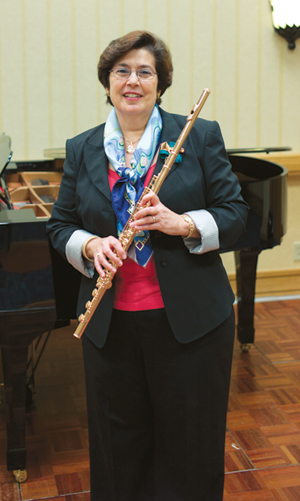 What did you do before winning the Met principal flute position?
What did you do before winning the Met principal flute position?
I was runner-up for the second flute position in the New York Philharmonic right after I received my master’s degree from Juilliard. Pierre Boulez, then the music director, was very taken with my playing and asked to have me there as often as possible. I subbed for the next two years until I began at the Met. I performed in more than 50% of the New York Phil concerts in those two years and sightread a concert at least once a month. Maestro Boulez had enormous faith in me. There is nothing more affirming than having someone like him in your corner.
How loud can you play or must you always be under the singers?
This would depend on the music, the singers and the conductor. Some conductors wanted the orchestra to be well under the singers; others wanted the orchestra to be important. In general, in a solo passage one can play out as if it is a solo piece. I always liked to play at a dynamic which supported the singer in passages with a prominent flute line. Of course, in an orchestral piece (such as the Carmen solo), I always played to the back of the 3800 seat hall.
How do you remember what to do in all the fermatas?
This is a good question as every conductor had a different way of dealing with these in each opera. Marking the part always helped. There are two principals at the Met, and we would often share rehearsals and performances. We did not always mark the part in the same way.
I developed a technique that others copied; whenever a conductor asked for something different than what was in the score (a different dynamic or rhythm), I would mark it with the conductor’s initials. That way, I was not surprised if the next conductor wanted something else.
What is the most difficult opera for flutists to play?
I found the most technically difficult operas to be Die Frau Ohne Schatten, Porgy and Bess, and War and Peace. I think the most difficult overall is La Boheme. It calls for just about everything in a flutist’s arsenal.
In a work like Lucia, do you rehearse separately with the singer?
Hopefully, yes. My first experience with Lucia was with Beverly Sills who refused to rehearse with me. Most of the sopranos I played with were as happy as I was to rehearse. When Eduardo Muller conducted, he got off the podium and had me stand on the podium during the cadenza. He was so lovely. He even put my music on the podium for me as he was stepping down one side and I was stepping up the other. Most often, I stood in the front of the pit for the solo and cadenza which allowed me to see the soprano.
What did you do if problems occurred during a performance?
From time to time someone did get lost. If it was the conductor, the orchestra, which was an amazingly tight unit, would just keep on going. Ray Gniewek was a great concertmaster who could always be counted on to take charge and lead from his seat. On the rare occasion that things would totally deteriorate, someone would always come in strongly, and the orchestra would rally and join in. If it was the singer who became lost, the orchestra had an amazing ability to jump as a unit either ahead or behind to be with the singer. This orchestra was always listening.
What advice would you offer to flutists who would like a career in opera?
I did not plan to have a career in opera. It just happened that way, and it was wonderful. If you plan to audition for an opera company, learn to play in the different style periods and listen to singers. Most importantly, study with someone who has worked in the opera. They will know how to guide you to play in the proper style.
Did you have time to teach students during your years with the Met?
Yes, I taught from the time I was 12 years old. It always seemed an important part of being a musician, and it is a wonderful learning experience.
How has your life changed as a university professor?
My responsibilities are different. Instead of making sure that I am in the best possible shape so I can play my best, I am doing all I can to help my students play their best. When I was at the Met, I was always playing. Interestingly, I feel that I have even less time to practice now, but I try to make sure that I do perform recitals and chamber works, so that I am always practicing for something. One of the joys of being with the wonderful faculty at the Frost School is playing chamber music with them. We do chamber concerts for all kinds of instrumentation.
What is your curriculum?
I try to bring out the best in every student. I do not have rules that you must know these pieces by a certain point as everyone moves at a different pace. I try to build on the positive. I do have a few rules including no negatives or marking circles on a part. (All markings you make on parts should be one-step directions.) I also oppose sliding the thumb from B flat to B and vice versa. The rest of my rules are positive.
Recently I instituted two new classes for my flute students. The first is an orchestral repertoire class in which we play through and work on an entire orchestral part. After the first semester of teaching this course, I was assigned a conducting fellow to conduct the orchestral score. As time went on, other woodwind performers began to attend the class as well.
Last year I began an audition preparation class. This class examines three to four orchestral excerpts one week, and then the next week the students audition on them in front of the class. The final exam at the end of the semester is a formal audition on everything covered during the term.
Do you ever commission works?
Not until now. Last school year my studio and I performed Henry Brant’s Angels and Devils for flute solo and flute orchestra. It was a wonderful experience to do with my students. We performed it twice, at the Frost School (below) and the Florida Flute Convention. I have asked Thomas Sleeper who is on the faculty here to write a piece with similar flute orchestration for my studio. We are looking forward to performing it next year.
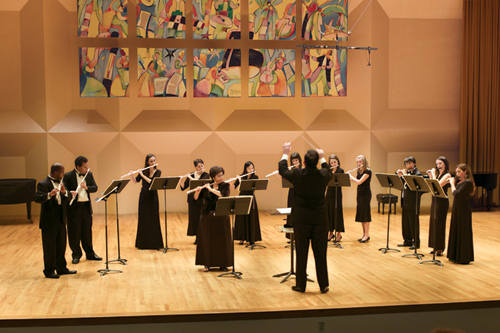
* * *
Tips for Success
• Always spell correctly. An E# is fingered like an F natural, but it is not an F natural. Spelling correctly makes reading scale passages easier and makes it obvious which note to trill to as some kind of E will trill to some kind of F.
• Mark parts clearly in pencil with what you need to know. Do not use negatives. Write the accidental, the note name, or the beat clearly so you see it easily and clearly in one step.
• If you make the same mistake twice, whatever the reason, mark the correction. Often the mistake is not where you are having the problem but in how you approach the passage or how you leave it. Begin your practice a little before the problem and continue to a little after. Then widen the scope a little at a time.
• When playing a run of many notes, the tendency is to begin slowly and rush to the end of the run. Practice the opposite. The result is usually easier to play and much clearer.
• Practice difficult passages as slowly as you need to play them perfectly. Always play the same way as you will when you play faster. This means to phrase the same way each time with the same dynamics and articulations. Mark breaths. Add extra breaths when playing slowly. As the tempo increases, eliminate the extra breaths. Often we play unevenly not because we play the difficult too slowly, but because we play the easy part too quickly.
• When playing from A# to B, use the long fingering or the B flat lever. Never slide the thumb from B flat to B or vice-versa to play a half-step.
• Every piece has its own harmonic rhythm (I first heard this in a class with Vincent Persechetti). If the harmony changes infrequently, you will want to play faster; if the harmony changes often, you will want to play slower.
• When you go up, when you go down, when you get louder or softer – open your throat.
• Every note is going or coming from somewhere.
• Wait until finished to congratulate yourself.
• All rules are made to be broken except these two: You must be comfortable and it should sound good.
Opera Excerpts
The audition list for opera orchestral positions can be overwhelming simply due to the length of each work. Kane suggests students begin with the following operas. Check your university library, www.lucksmusic.com, www.imslp.org for the complete scores and complete flute/piccolo parts. John Wion has compiled nine volumes of Opera Excerpts. Listen to several recordings of the opera because tempos will vary from conductor to conductor.
Beethoven: Leonore, Overture No. 3
Bizet: Carmen
Rossini: William Tell
Strauss: Salome
Bellini: Norma
Britten: Peter Grimes
Donizetti: Lucia di Lammemoor
Puccini: Manon Lescaut
Opening of opera and solo opening of Act II
Strauss: Der Rosenkavalier
Two solos in Act I and opening of Act III
Verdi: Aida and Rigoletto
Important Teachers
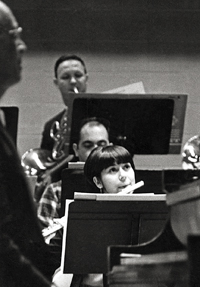 My junior high school and high school years were on Long Island where I studied with Ruth Freeman and Harold Bennett. I played in the Huntington Symphony (left, age 16), a semi-professional orch-estra. I began as the piccolo player in 9th grade and moved one chair at a time to principal flute. The first time I performed Afternoon of a Faun was in my junior year in high school.
My junior high school and high school years were on Long Island where I studied with Ruth Freeman and Harold Bennett. I played in the Huntington Symphony (left, age 16), a semi-professional orch-estra. I began as the piccolo player in 9th grade and moved one chair at a time to principal flute. The first time I performed Afternoon of a Faun was in my junior year in high school.
My parents, both music teachers in Commack, Long Island, chose to live in another school district from where they were employed. This district, Northport, had a very strong music program. Over the years many musicians came out of there.
My Dad was my first piano teacher and flute teacher. Later he attended all of my lessons, and we would discuss them on the way home. He didn’t really expect his daughters to be successful professional musicians (my sister sits in the front of the first violins in the LA Philharmonic). He often said to me that if I wanted to win an audition, I not only had to be better than all the guys, I had to be a lot better. I took that seriously and worked hard.
My high school piano teacher, Sam Lehrer, opened my eyes to music and phrasing. I had the wonderful good fortune to study the flute with Harold Bennett for the last two and a half years of high school. He was wonderful at explaining things. When I began with him, he had just retired as principal flutist at the Met. He was so tickled that I got the same job ten years later. Sometimes, during my first few years at the Met, my phone would ring shortly after midnight and it would be Harold. “What are you playing,” he would ask. Then “and are you doing it in one breath; you should” or some other valuable piece of advice.
When I attended Juilliard, I went back to him every few months for a check-up of both my playing and the flute (he was a wonderful repairman as well) for the first few years. Of course, I went to him to help prepare for the Met auditions. At Juilliard I studied with Julius Baker. His playing was so inspiring. Just listening to him play was a lesson in itself.
